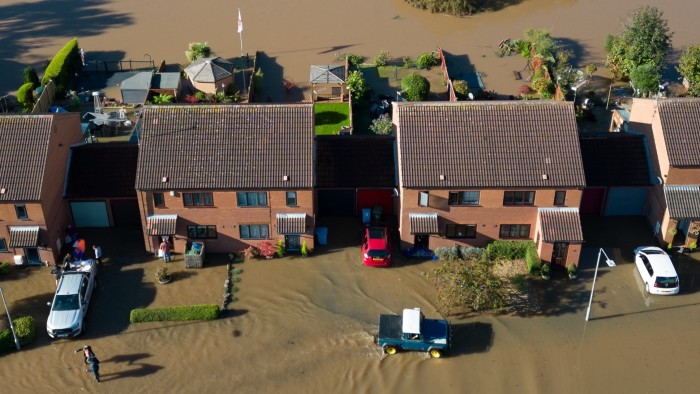Unlock the Editor’s Digest for free
Roula Khalaf, Editor of the FT, selects her favourite stories in this weekly newsletter.
UK property insurance payouts are set to hit their highest level in nearly 20 years, driven by high building costs and the effects of climate change.
Claims paid by insurers in 2024 will total £5.5bn, according to a new analysis from consultancy Deloitte, the highest level since 2007 when torrential summer floods broke records and were classified as a natural disaster.
Property rebuilding costs started to rise in 2020, driven by the pandemic, Brexit, and other supply chain problems, according to James Rakow, insurance partner at Deloitte. Inflation began to ease in 2024, he said, but costs were “staying at high levels.”
Figures for insurers’ payouts in 2024 include some claims arising from the end of 2023, including Storm Babet in October of that year, which triggered severe flooding. Claims related to weather, including floods, storms and freezing temperatures, were expected to reach £1.2bn, Deloitte said.
Industry experts have forecast that insurers will push premiums still higher after facing multiple years of underwriting losses.
The average price of an annual home insurance policy, covering buildings and contents, was £407 in the third quarter of last year, 16 per cent higher than the same period the previous year and a nominal high. Adjusted for broader inflation, that was comparable with levels reached in 2017. Claims, however, had risen 72 per cent compared with 2017.
The development of new housing is another driver of higher payouts.
“The lack of available housing in the UK and the speed at which it is being addressed is an important and well-publicised issue, but the flipside is that every new home carries some level of flood risk. And in some cases, high-risk land may be all that is left to be developed to satisfy demand,” said Oliver Wing, chief scientist at flood risk modeller Fathom.
The summer of 2007 was the wettest on record in the UK, with flash floods leading to £3bn being paid out in claims. The event prompted concern within the industry over the risks related to climate change, particularly to flooding in expensive parts of London, such as the office complexes of Canary Wharf.
Short, intense spells of rainfall were becoming more frequent as the UK climate became hotter, Wing said, which frequently “overwhelms Victorian-era sewer systems” in cities, leading to floods.
A paper from Fathom found that the half-degree increase in global warming from 1990 to 2020 raised the severity of intense flooding — floods that would typically only occur once every 100 years — by about 6 per cent.
But climate change alone could not explain a spike in claims for any given year, Wing added. “I find it better to think of it as ‘loading the dice’ — worsening the longer-term background conditions which fuel severe weather events, while losses in any particular year are much more driven by sheer randomness thanks to the chaotic nature of the atmosphere.”


